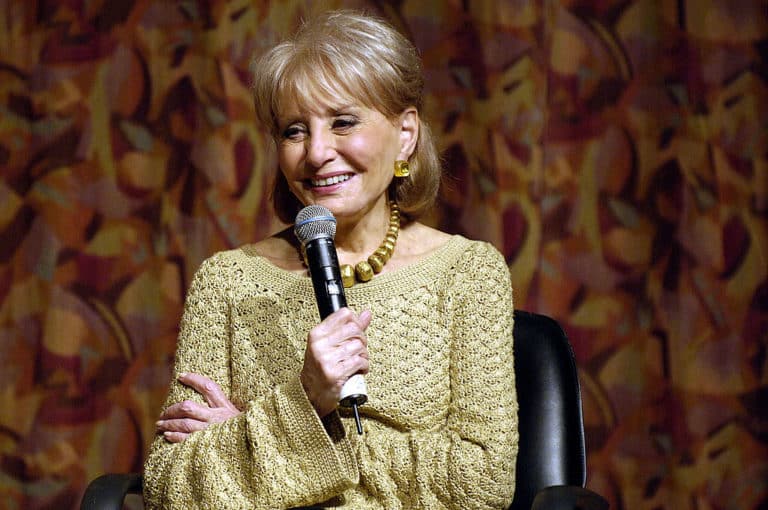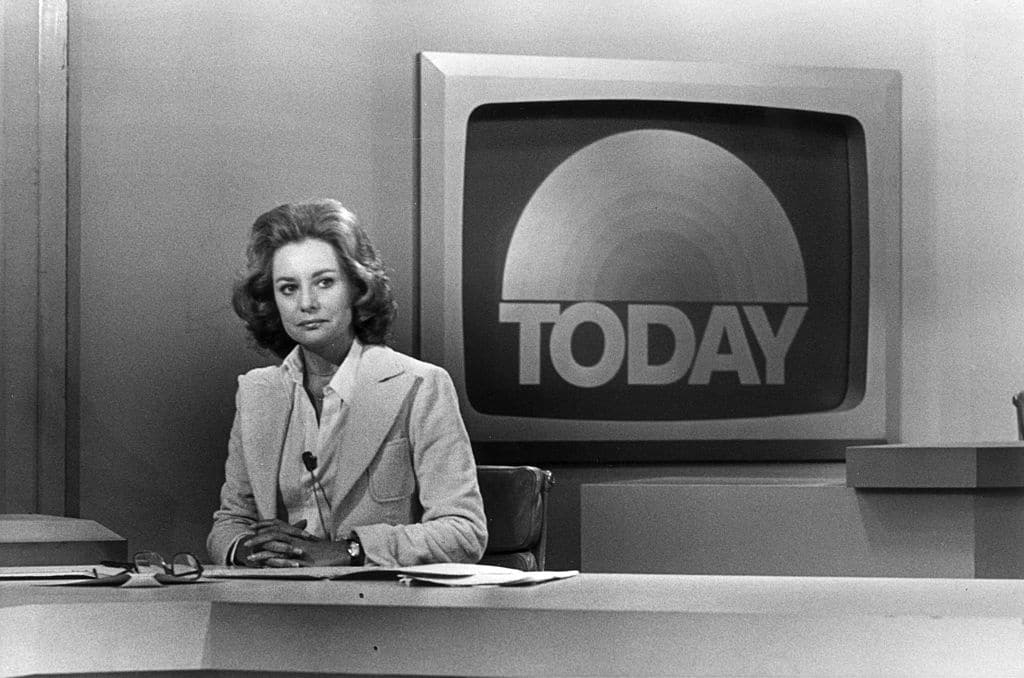
Editor’s note: The following article contains original research by Sara Himeles, drawing directly from Barbara Walters’ memoir, “Audition.”
The legendary Jewish journalist Barbara Walters was a role model and trailblazer “not only for female journalists but for all women,” her spokesperson Cindi Berger told CNN in a statement.
Of course, her interviewing style, hard work ethic, and success in her field inspired men and women alike. Both of her parents descended from immigrants who fled antisemitism in Eastern Europe; for the Jewish community, she was an icon as well.
Walters interviewed just about every world leader and celebrity of her time. She interviewed Margaret Thacher of Great Britain, Indira Gandhi of India, King Abdullah of Saudi Arabia, Vladimir Putin and Fidel Castro, to name a few.
She also interviewed three Israeli prime ministers — Golda Meir, Menachem Begin, and Yitzhak Rabin — plus former Israeli Defense Minister Moshe Dayan.
Walters’ interviews covered major moments in Israeli and Jewish history — most famously, Egyptian President Anwar Sadat’s historic visit to Jerusalem in 1977, the Camp David Accords, and the peace deal between Israel and Egypt.
In her book, “Audition: A Memoir,” she wrote that covering the peace talks between Egypt and Israel was “the time in my professional life that meant the most to me, and of which I am proudest…. I played a small part in those difficult, tumultuous, and now historic times, and I cherish the memories.”
She was also married four times to three different Jewish men, to business executive Robert Henry Katz, theatrical producer Lee Guber, and twice to Lorimar Television CEO Merv Adelson.
So, what were Walters’ memories of Israel and how did she relate to her Jewish identity? Below are 7 things you need to know about her Jewish and Israel connections.
Walters didn’t have a Jewish education or celebrate the holidays.
Walters was born in Boston on September 25, 1929, and the family later moved to Miami Beach and then New York City. She attended public schools in Brookline, Massachusetts and Miami Beach, and private schools in New York City.
“I never remember either of my parents setting foot in a temple,” Walters wrote in “Audition.” “My father used to say he was an atheist…We never [celebrated the holidays].”
However, Walters’ mother did light Shabbat candles every Friday night, and her father — who was in the nightclub and entertainment industry — would make a special effort to be home.
“We certainly knew full well that we were Jewish. But practicing the religion never seemed important,” Walters wrote. “As a result, I have no Jewish education…and don’t observe the holidays.”
Although she did not celebrate Yom Kippur, Walters had a tradition of not going on air that day “out of respect for my religion.”
Walters discovered a deep connection to the state of Israel.

The TV anchor didn’t visit Israel (or anywhere in the Middle East) until she was 43 years old. In 1973, she traveled to Israel to interview then-Israeli Prime Minister Golda Meir on the 25th anniversary of the founding of the state.
“Although I’m Jewish, I had never had any great desire to go to Israel,” Walters wrote in “Audition,” adding that her parents bought Israel Bonds but didn’t have much of a connection to the Jewish state. “So I had little sense of expectation when I arrived in Jerusalem.”
“To my great surprise, Israel overwhelmed me and aroused feelings I never knew I had,” she added. “I couldn’t get over the beauty of the land itself, at once rocky and arid, yet lush where the Israelis had ingeniously brought water to the desert. I felt a starting and quite strong connection.”
Walters was friends with Israeli Defense Minister Moshe Dayan.
While she was in Israel to interview Meir, Walters also met and interviewed the Israeli defense minister, Moshe Dayan, and the two became fast friends.
Walters was an admirer of Dayan, writing that he was “a dashing and heroic figure” and “very good-looking.” “Someone once described him, I think accurately, as looking like an Oriental prince,” she explained. “That’s the dashing part. The heroics were his military past.”
Of all of the people Walters interviewed, “Dayan was certainly one of the bluntest,” Walters wrote. She told the following story about him:
His best, and occasionally worst, quality was that he didn’t care what anyone thought about him. I remember asking him something or other during the interview to which he responded: “That’s a silly question.”
“Okay,” I charged back. “If you think that’s a silly question, why don’t you ask the right question, then answer it, and I’ll just sit here and we’ll be fine.” He didn’t expect that response from me. He laughed out loud, and that was the moment our friendship started.
Walters interviewed Menachem Begin and Anwar Sadat, together.
In November 1977, Egyptian President Anwar Sadat made a historic visit to Israel, marking the beginning of the peace process between the two countries. Walters was one of the members of the press on Sadat’s plane (along with the famous broadcast journalists Walter Cronkite and John Chancellor).
She wrote that the day that Israel welcomed Sadat “was one of the most glorious days I have ever experienced.” She reflected on the scene at the airport:
“There were hundreds of people waving Israeli and Egyptian flags. I wondered how the Israelis had managed to get so many Egyptian flags so quickly. And how the Israeli army band had gotten the music and learned the Egyptian national anthem.
But most of all I remember all of Sadat’s former enemies lined up to greet him — Menachem Begin, Golda Meir, Moshe Dayan, Ariel Sharon, Yitzhak Rabin. It was almost too much to comprehend.”
The next day, after Begin and Sadat spoke before the Knesset, Walters sat down with the two leaders in their first-ever joint interview. Although the two men expressed their admiration for each other, their disagreement over the details of a peace plan foreshadowed the difficulties that would lie ahead.
Barbara Walters’ pathbreaking joint interview with Begin and Sadat, 1977: pic.twitter.com/LouODi9C8g
— Michael Beschloss (@BeschlossDC) December 31, 2022
Walters wrote that this high-profile interview helped solidify her status “as a serious journalist. It didn’t hurt that I’d gone head-to-head with Chancellor and Cronkite, the top men in broadcast journalism at the time…. From that time on I was more or less accepted as a member of the old boys’ club.”
Walters was appalled by the antisemitism she witnessed in Saudi Arabia.
In “Audition,” Walters recalled her 2002 trip to Saudi Arabia to interview King Abdullah. It was a little over one year after the 9/11 attacks. Walters wrote that the high school textbooks she saw “were particularly disturbing in their repeated depictions of Jews.”
One “textbook” she saw had a story about a talking tree behind which a Jew is hiding. ‘Muslim, come forward,’ the tree calls out. ‘There’s a Jew hiding behind me. Come and kill him.'” She was appalled that the textbooks contained such horrible, antisemitic material.
Walters was equally disturbed when a university student she interviewed claimed that “Zionists must have attacked the World Trade Center because four thousand Jews stayed home from work that day,” and that “the Jews were responsible for every war throughout history.”
Walters responded with her typical poise and grace. “I countered with the facts, but I did not argue with the students,” Walters wrote. “Their harsh prejudiced views revealed so much about aspects of the company’s culture.”
Walters enjoyed a memorable night at the Dead Sea.
One night during her first trip to Israel, Walters was planning to hear the Israel Philharmonic, “but got sidetracked by a very attractive Israeli professor I’d met that afternoon on a tour of Old Jerusalem.” The professor offered to show her “the Dead Sea by moonlight” and she couldn’t resist.
“Off we drove that evening to the lowest point on earth,” she wrote in “Audition.”
“The moon was just coming up, illuminating the still, calm water,” she continued. “I clearly remember going into the very salty, very warm water, which was so dense you could float effortlessly. I calmly floated on my back in the moonlight, thinking how ironic it was to find such peace in such a volatile region.”
Walters felt like an “outsider” even when she reached the top of her field.
Although this is not a literal Jewish connection, it is in a more abstract sense. One of the main themes of Walter’s memoir is her feeling of being an outsider, even as she broke glass ceilings and became an international public figure. “As I look back, it feels to me that my life has been one long audition — an attempt to make a difference and be accepted,” Walters wrote.
This theme of the desire to belong appeared early on. When she was about seven years old, her school put on a play and, no surprise, Walters received the lead role. However, she didn’t want to be the star.
“I wanted to be in the chorus, to be like all the other kids,” she wrote. “To this day, I recall going home and watching my mother, who sewed very well, cheerfully making my robin costume. I tried it on, with its big, gorgeous red belly, spread my wings, and burst into tears.” Walters and her mom tore up the costume and she became a member of the chorus.
Walters always felt like she was auditioning,” no matter how high my profile became, how many rewards I received, or how much money I made.” Although this caused her understandable anxiety, on the positive side, it also made her extremely driven.
“I’ve worked as hard or harder than anyone else, accepted most every assignment, done my homework, kept complaints to myself, finished the job, and moved on,” she wrote. “That is not a bad formula for success.” Thank you, Barbara Walters, for blazing the trail for so many women and for inspiring everyone.
Originally Published Dec 31, 2022 08:19PM EST


